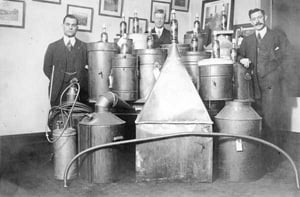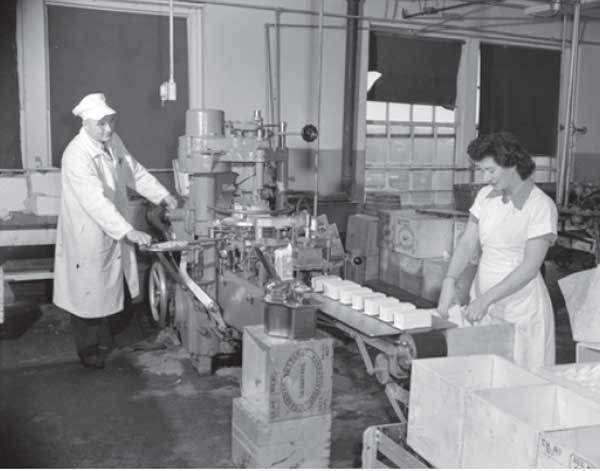
British Columbia Day is nearly upon us — a time to relax, enjoy a day in the sun and imbibe heavily in the name of provincial pride. It's also a time to reflect on our heritage, and think back on the famous people and important dates that define British Columbia: characters like George Vancouver and Matthew Baillie Begbie, the last spike at Craigellachie and the establishment of the 49th Parallel.
But for every name and date that made its way into your social studies textbook, there are dozens more that were lost to history — some particularly strange. For every W.A.C. Bennett, there's also an Amor De Cosmos (look it up). So, just in time for your holiday weekend, we take a look back at some of the most bizarre moments in B.C. history — with nary a mention of the Hudson's Bay Company.
1. B.C.'s Prohibition commissioner was himself thrown away for bootlegging
Walter Findlay made his name as a crusader against the evils of alcohol. Rising to prominence as a member of the People's Prohibition Association, he was an obvious choice for the newly-created office of Prohibition commissioner when liquor consumption was declared illegal in 1917. So it came as no small surprise to British Columbians when, in December 1918, less than a year into his tenure, Findlay was arrested for the sale and import of liquor — some confiscated, some rerouted from other destinations, and some simply stolen from government storehouses.
"W.C. Findlay, ex-Prohibition commissioner, is being sought on a warrant charging him with breach of trust in the performance of his duties as a public official," the Vancouver Province wrote. "The maximum penalty on conviction is five years imprisonment in the penitentiary."
Findlay was hardly alone in his cavalier attitude toward alcohol. Before the measure came into effect, B.C. was one of the wettest provinces in the country; saloons were permitted to remain open 24 hours a day, and British Columbians consumed roughly twice the national liquor average. As in most American states, Prohibition (which only lasted from 1917 to 1920) was an utter failure in British Columbia. In addition to a roaring bootleg trade, B.C. doctors were also permitted to write prescriptions for "medicinal" liquor — prescriptions which netted the government more than $1.5 million in 1919 alone. At the time of his arrest, Findlay had already been fined $1,000 for the illegal import of liquor, and when ordered to appear before a Royal Commission, he refused to testify or answer any questions.
Despite his refusal to talk, the packed courtroom heard startling testimony from a number of witnesses, alleging the existence of a citywide storage and distribution network ("a complete delivery system existed by which liquor found its way to private addresses," one witness alleged), even pointing to a liquor delivery service run by the Hudson's Bay Company.
At the close of the Royal Commission, Findlay was sentenced to two years in prison. Owing largely to Findlay's refusal to testify, the full scope of the city's bootleg liquor traffic was never explored.
2. Canada's most notorious train robber was captured outside of Kamloops
Ezra Allen "Bill" Miner was in his late fifties when he staged what was long thought to be Canada's first train robbery (the first was actually in Ontario in 1874), a dramatic heist outside of Mission which netted him and his gang close to $400,000 in gold, cash and securities.
A small-time thief and stagecoach robber in the U.S. for three decades, Miner was known widely as the Gentleman Bandit — owing to his exceptional politeness while committing robberies — and had a reputation for stealing only from the rich (he never took from passengers or engineers, for example, and on at least one occasion returned money to someone he had robbed). That first heist near Mission in 1904 caught the attention of the CPR, who in turn dispatched the Pinkerton Agency, but by then Miner had disappeared, settling in the interior under a fake name.
Unfortunately, the Australian securities he had stolen were all but impossible to fence without attracting undue attention, and by the spring of 1906 Miner was in dire need of funds. He assembled a new gang with the intention of robbing a second CPR train outside of Kamloops. The job was a disaster, netting them only $15 and a bottle of decongestant pills, and with the North-West Mounted Police on their trail, Miner and his crew were quickly surrounded at their camp outside of town.
"The camp was quietly surrounded, and we commenced to close in on them," Const. William Fernie explained in an interview with the Province. "A fusillade of shots from the brush showed that they had spotted us and intended to put up a fight."
The shootout that followed was about as undramatic as they come. William "Shorty" Dunn, a member of Miner's gang declared: "You'll never take me alive!" at which point a police officer shot him in the thigh, and he immediately surrendered. After that brief exchange of gunfire, Miner gave himself up, with his customary good manners (Dunn is said to have jeered: "It's a damned shame you didn't put that bullet through my head!"). Although he was quickly found guilty and sentenced to life in the New Westminster penitentiary, Miner and his accomplices served less than a year before they staged a dramatic escape.
"They excavated a hole under the wall near the brick smokestack," a 1907 edition of the Province recounted, "and escaped into another field of the prison grounds. Although this yard is surrounded by high fencing, the fugitives managed to scale this by means of a ladder, and got clear away into the surrounding brush."
Miner returned to the States, where he continued his criminal career for another six years. He died in a Georgia prison in 1913.
3. At least two B.C. residents have been attacked by sharks — right here in B.C.
The coastal waters of British Columbia hardly seem like an ideal breeding ground for shark populations. Yet near the dawn of the 20th century, Vancouver was the site of two different shark attacks — though in both cases the only fatalities were the sharks themselves.
The first took place in 1905, when an 1,100-pound shark "of the genuine, Hawaiian, man-eating variety" (according to the Vancouver World) attempted to devour eight-year-old Harry Menzies as he waded in the placid waters of False Creek.
"Ed Dusenberry, who lives nearby and has several small boats for excursion purposes on shore, was standing idly looking at [Menzies] playing," the World wrote. "His attention was suddenly attracted to a wave approaching the small boy, as though some other boy were swimming under water to grab the wader by the leg."
Dusenberry called out to the boy, who much like any eight-year-old would if he noticed a dorsal fin moving in his direction, ran for shore. To the horror of those watching, the shark followed, hurling itself after Menzies and grounding itself on the beach. After making sure Menzies was safe, Dusenberry armed himself with a pike and stabbed the flailing creature to death. Enterprising fellow that he was, he then put a tent up around the shark and charged curious passersby 10 cents admission. Though it was examined thoroughly, and remained on the beach for several days, the reason for the creature's presence in the waters of False Creek was never determined.
Exactly 20 years later, in January 1925, Australian John Bruce had a similar encounter as he worked to fix a broken water main in the Second Narrows.
"It was early in the afternoon while I was surveying the pipes for possible leaks that the shark appeared," Bruce later explained to the Province, "and I saw the dark shadow of his form coming for me. It made three attacks and for 15 minutes I had to watch my step and an opening for an uppercut. On the second I hit him on the nose with an iron bar I had for warding off any prowling octopus."
Bruce spent 15 minutes locked in combat with the shark before managing to gain the upper hand, killing it with three powerful blows to the head. Again, no reason for the shark's presence could be determined.
"I have had tussles with sharks in many waters, but never before one in these, nor anywhere at that depth," Bruce concluded. "The next time Mr. Shark will find me well armed, believe me."
4. Victoria is our provincial capital partly because an MLA was drunk at work
In the late 1860s, the debate over the location of B.C.'s capital was a furious one. Politicians were more or less evenly divided, with half favouring its then-current home in New Westminster, and the rest advocating relocation to Victoria. Discussion had been ongoing for close to two years, and coming into the 1868 session, politicians realized that no clear victor was evident.
"We counted the noses of our friends and found ourselves in a pretty tight space," Speaker J.S. Helmcken later recalled in his memoirs. "The Governor, if he laid any pressure on the official members, could decide the matter either way he chose."
On April 2, 1868, MLAs from both sides of the debate were invited to take the floor. Representing the New Westminster side was an MLA named William Franklyn — genial, nearsighted, and as Helmcken noted, a man who "liked a drop of the creature occasionally."
Unfortunately for New Westminster supporters, Franklyn took more than a drop of "the creature" at lunch that afternoon, and as he stood to deliver his speech — an attempt to neutralize concerns over navigating the Fraser River by comparing it to the Hooghly in Kolkata — the results were disastrous.
"Mr. President," he began, "when I went up the Hooghly 40 years ago, the navigation was very intricate, the river full of shoals and sandbanks, a very great deal worse than the Fraser River."
As Franklyn completed the first page of his speech, William George Cox (an MLA sympathetic to the Victoria cause) simply placed it back on the top of the pile, and Franklyn, sufficiently intoxicated, picked up the sheet and immediately began again with "Mr. President. When I went up the Hooghly 40 years ago... "
After several more trips through the first page, Franklyn began to grow confused and took off his spectacles to mop his brow, at which point Cox delivered the coup de grace: removing the lenses from his opponent's bifocals, so that, in Helmcken's words, Franklyn was "unable to see the Hooghly or anything else."
The session had to be adjourned for a half hour because MLAs couldn't keep from laughing. Victoria officially became the provincial capital in 1871, and Franklyn lost his post as an MLA shortly thereafter. Unfortunately for pro-Victoria MLAs (Helmcken among them), the debate had taken place in New Westminster, and they spent the remainder of the evening in a local hotel penned in by an angry mob and fearing for their lives.
"There is a ridiculous side to most subjects," Helmcken later wrote. "The capital question is not an exception."
5. B.C. banned margarine for 70 years
Everyone's favourite vegetable-based butter substitute has been around for longer than you might think. In fact, it was first synthesized in France in 1869 and was being commercially produced as early as the 1870s. Fearful of the product's impact on butter sales, however, the B.C. Dairy Industry lobbied the provincial government to have it declared illegal in 1886. It remained a banned substance for the next 70 years (though presumably, since the ban didn't have the support of the federal government, the punitive measures exacted against the province's butter outlaws were, er, marginal).

Following the conclusion of the Second World War, the debate once again spread across the province. In the pages of local newspapers, pro-butter and pro-margarine forces began to rattle their sabres. Politically, margarine had the support of both Point Grey MLA Tilly Rolston and Attorney General G.S. Wismer, as well as a letter-writing initiative which included more than 1,500 B.C. women. Part of a series of sweeping changes taking place on the province's countertops throughout the 1930s and '40s (sliced bread had changed everything when it was introduced in 1937), margarine was finally legalized on March 24, 1949, though not without restrictions.
"The legislature gave its approval Wednesday to the margarine measure which specifies the amount of yellow colouring allowed in it, requires clear labelling that it is not butter and makes restaurants inform the public when they are serving it instead of butter," the Province reported. "Several uttered minor protests against allowing any yellow in oleo at all, but there was no attempt to call a recorded division on the question."
Among the restrictions: margarine had to be clearly labelled, couldn't be used in any provincial institution, and was forbidden from resembling butter in shape or colour. After a hard-won victory, Vancouver would go on to produce the first commercial margarine in the country. Anecdotal reports indicate that early consumers couldn't believe it wasn't butter.
Got other favourite bizarre B.C. stories? Share 'em with us in the comment thread below. ![]()
Read more: BC Politics















Tyee Commenting Guidelines
Comments that violate guidelines risk being deleted, and violations may result in a temporary or permanent user ban. Maintain the spirit of good conversation to stay in the discussion.
*Please note The Tyee is not a forum for spreading misinformation about COVID-19, denying its existence or minimizing its risk to public health.
Do:
Do not: